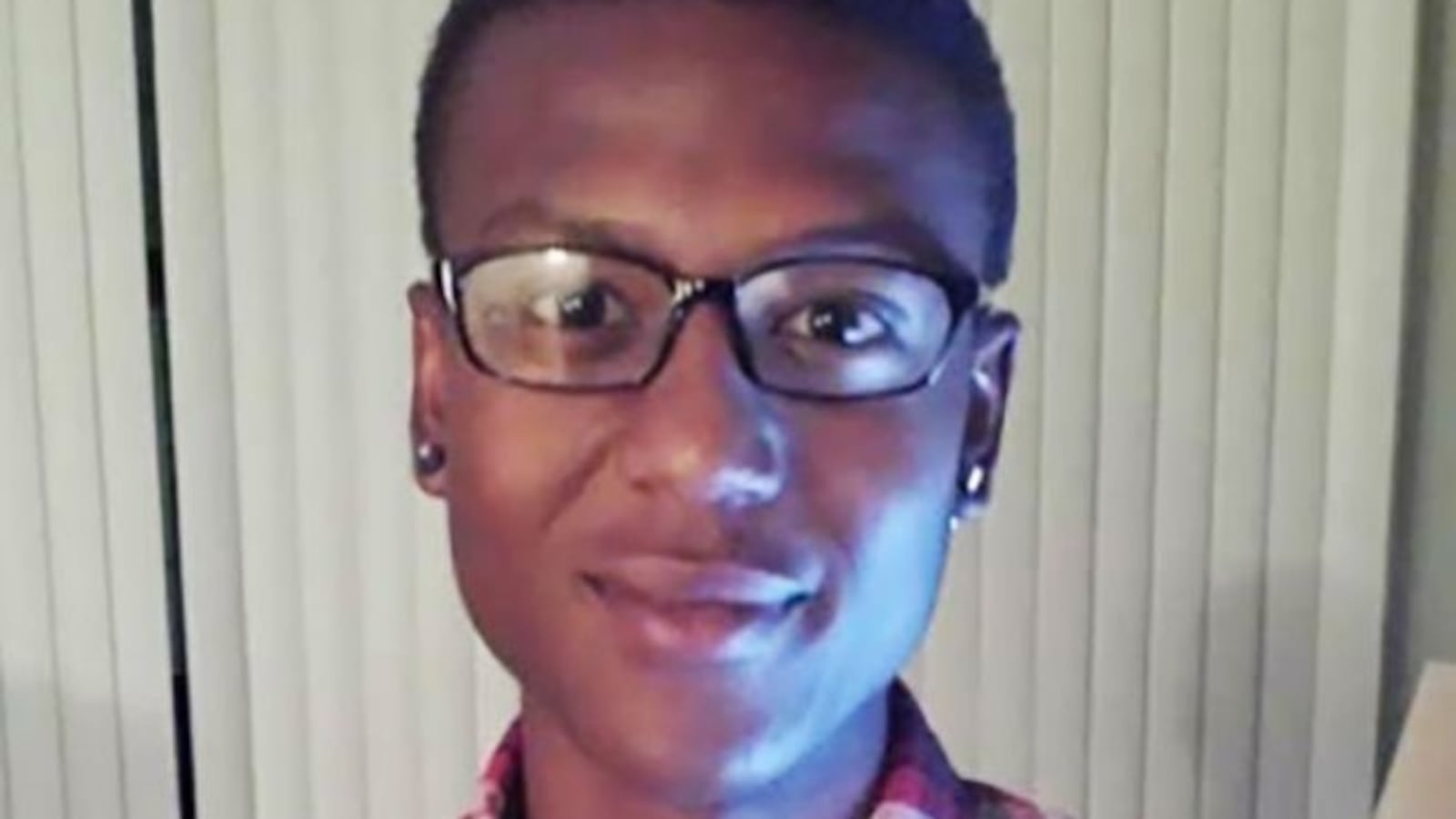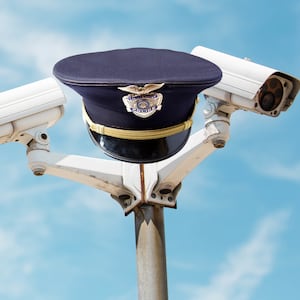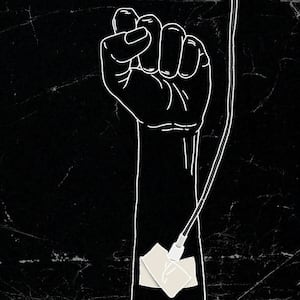Elijah McClain was walking home from the convenience store on an unusually cool Saturday night in August 2019 when three Aurora, Colorado police officers approached him.
According to the official police report, a resident called 911 because the 23-year-old massage therapist was wearing a ski mask and “acting weird” by “waving his arms around,” prompting the officers to approach him and attempt to pat him down. But McClain, who had made the quick grocery run to pick up bottled tea for his cousin and wore an open-faced ski mask because he had anemia that often made him cold, was unarmed and simply listening to music.
During the 15-minute altercation, the three officers tackled McClain to the ground and put him in a carotid hold after one officer was heard saying, “He’s going for your gun.” In the audio from the officers’ body camera, McClain begs for his life and he repeatedly tells police he couldn’t breathe.
“I have no gun. I don't do that stuff,” McClain is heard saying, after denying he is resisting arrest. “I don't do any fighting. Why are you attacking me? I don't even kill flies.”
When first responders arrived, they injected him with ketamine to sedate him—even though McClain had passed out in the police restraint. He suffered a heart attack in the ambulance and was taken off life support six days later.
None of the officers involved were charged. But on Thursday, nearly a year after McClain’s death and amid nationwide protests against police brutality, Colorado Gov. Jared Polis named a special prosecutor to re-examine his case, vowing justice for his family.
“Elijah McClain should be alive today, and we owe it to his family to take this step and elevate the pursuit of justice in his name to a statewide concern,” Polis said in a statement. “Now more than ever, we must do something within our power to foster public trust and confidence in law enforcement and the criminal justice system.”
“As a father, my heart breaks for the McClain family. All Coloradans should be safe walking home from the convenience store, or just being in their own neighborhoods listening to headphones,” he added. “We need to do a better job, and at a bare minimum they deserve a thorough review of the case.”
The Aurora Police Department officers involved in McClain’s death—Nathan Woodyard, Jason Rosenblatt, and Randy Roedema—were placed on administrative leave after the incident. Three months later, they were reinstated after Adams County District Attorney Dave Young declined to file criminal charges.
“They murdered him. They are bullies with badges,” Sheneen McClain, the 23-year-old’s mother told CBS News on Thursday.
In the wake of outrage over George Floyd’s death in Minneapolis in May, protesters have called for renewed attention on several deaths at the hands of police—including McClain’s. To date, at least three million people have signed an online petition urging government officials in Aurora, Colorado, to conduct a new investigation into McClain’s death while a GoFundMe for his family has raised at least $1.4 million. City Manager Jim Twombly agreed on June 9 to undertake an independent investigation of McClain’s death.
But while several prominent leaders and celebrities—including Sen. Elizabeth Warren (D-MA), Padma Lakshmi, and Roxane Gay—are among the millions demanding justice, the district attorney who handled the case has doubled down on his decision not to prosecute.
In a Thursday statement, Young stated that while McClain’s death was “tragic and unnecessary,” he stood by his belief that “the evidence does not support the filing of homicide.”
“While the officers no doubt used force in this incident, based on the evidence and the law applicable at the time of Mr. McClain’s death, the prosecution cannot disprove the officers’ reasonable belief in the necessity to use force,” Young, the district attorney for the 17th Judicial District, said. “Ultimately, while I may share the vast public opinion that Elijah McClain’s death could have been avoided, it is not my role to file criminal charges based on opinion, but rather, on the evidence revealed from the investigation and applicable Colorado law.”
Mari Newman, a lawyer for McClain’s family, told NBC News that although the family was grateful for the national support, they remained frustrated by the inaction against those involved in the 23-year-old’s murder.
“I think it is clear that there needs to be an independent investigation, which is why I began demanding one last fall,” Newman said.
According to the official report, the Aurora Police department received a call from an unidentified resident at 10:32 p.m. on Aug. 24, 2019, about a “suspicious Black male wearing a ski mask.” Woodyard, who was the first officer to arrive at the scene, said McClain was “wearing a ski mask, brown coat, and black pants,” and he got out of his car to ask him to stop three times.
When McClain ignored the commands, Woodyard said he approached the 23-year-old, who allegedly told him, “I have a right to go where I am going.” In response, Woodyard said, “I have a right to stop you because you’re being suspicious,” before grabbing McClain’s arm.
The report states that McClain “immediately tightened up his arms and pulled them into his chest,” prompting Rosenblat and Woodyard to continue to grab the 23-year-old, who was “clutching to his chest a plastic type shopping bag with items in it.”
“Let me go, no let me go, I am an introvert, please respect my boundaries that I am speaking,” McClain told the officers, according to the body-camera footage. When the officers told him to “relax,” McClain stated he was going home.
As officers continue to hold him, McClain added, “Can you leave me alone? You guys started to arrest me and I was stopping my music to listen, now let me go.”
But while the 23-year-old continued to frantically ask to go home, one of the three officers accused him of reaching for another cop’s gun. In the body-cam footage, McClain can be heard begging for his life as he tearfully struggled for air and then vomited while in the chokehold. He repeatedly told the three officers that he couldn’t breathe.
The report said that the three officers then quickly forced McClain to the ground. When Rosenblatt unsuccessfully attempted a carotid control hold, Woodyard put McClain in a chokehold, which applies pressure to the head and restricts blood flow to the brain.
While in the hold, McClain passed out, according to the report, and the officers called for medical assistance. Paramedics who arrived at the scene injected McClain with ketamine to sedate him, stating they were unable to “gather any medical history or speak to Mr. McClain as he was combative and appeared to be showing signs of excited delirium by his appearance and his aggression.”
Once loaded into the ambulance, paramedics observed that McClain “did not have a pulse.” Authorities later said he “suffered a cardiac arrest and lifesaving measures were initiated.”
McClain was declared brain dead at 3:51 p.m. on Aug. 27, 2019. The Adams County Coroner’s Office found that he died from “undetermined causes,” but did not rule on whether the police chokehold—or the sedative ketamine—might have contributed to his death.
“A carotid control hold was applied during the decedent’s restraint,” Dr. Stephen Cina, a forensic pathology consultant, said in the report. “The records indicate that the decedent was still struggling with officers after this hold was removed. He then coded after receiving a dose of ketamine.”
Newman said this week she was dismayed that—despite the mounting evidence that she believes proves McClain was murdered—it took millions of protesters to finally spur justice.
“It’s unfortunate that it takes international media pressure and petitions signed by two million people before the elected officials would do their jobs, and by elected officials I mean the DA and the mayor,” she said.








